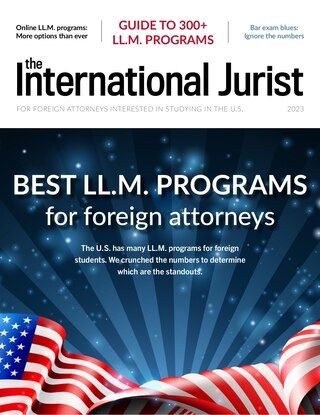When the path is unclear, the question becomes even more critical. An LLM student’s path after graduation is uncertain at best. No A, B, C guide available, no quick fix solution at hand. This is not because success as an LLM student is impossible. By no means. It is because of the diversity of the LLM student body. A 23-year-old LLM student from Germany with no work experience who is seeking a position in an IP law firm, by definition, has a different path from a 48-year-old LLM student from China with 23 years of experience in M&A seeking an in-house position.
I recently received a message that resembled 95% of messages that I receive:
I am about to start my LLM at XYZ, and like many other LLM students, I would like to work in the U.S. afterward. I plan to sit for the N.Y. bar exam, and it would be really great to supplement my education with work experience. I saw your articles on the National Jurist website. Any suggestions you have would be very helpful.
This message is perfectly nice, and I am always happy to get to know new people. Even more so, I would very much like to share some thoughts with that person in the hope that they are helpful. But the problem is, what do I say? It is not that I do not want to answer, but that I cannot answer. The question is too broad. LLM students should remember the following equation:
The broader the question, the less valuable the answer.
My answer could be something like this: “It’s important to start building relationships within the legal community as soon as possible. Your grades are important, as well. Be sure that you are clear about your employment goals. I wish you all the best.” This answer is largely worthless, but at least I did not have to ignore the message.
Many LLM students don’t think about how different types of questions can lead to different outcomes. We can steer a conversation by asking the right kinds of questions, questions based on the problem we are trying to solve.
The Harvard Business Review outlines four types of questions that can reach four different goals.[1] I would like to highlight three that could specify the message above to make it more answerable:
- Clarifying questions help us better understand what has been said. For example, “Why do you say so?” In the message above, the author could have said: “In your recent article XYZ, you emphasized the importance of building relationships. Why do you think that building relationships is so important for LLM students?”
- Adjoining questions are used to explore related aspects of the problem. For example, “How would the insights you shared in your article XYZ regarding employment in big law apply to an LLM student from India with no experience? Is the advice the same or does it change?”
- Funneling questions are used to understand how an answer was derived and to understand the root causes of problems. For example, “How did you come to the conclusion that networking is important for LLM students?” “How did you do your analysis?”
These are just examples and by no means the only way to draft questions. The key takeaway is this: The questions you ask will determine the answers you receive. The more specific the question, the more precise the answer. If we are not willing to put effort into our questions, we cannot expect the other to put effort into trying to deconstruct the question and refine the answer. A broad question is not only unhelpful but it also reflects laziness in identifying both problems and goals.
I suggest that you experiment with different types of questions and compare the answers that they produce. You can learn from this experience and become better at asking questions, which will lead to better answers and a clearer path for you to follow.






